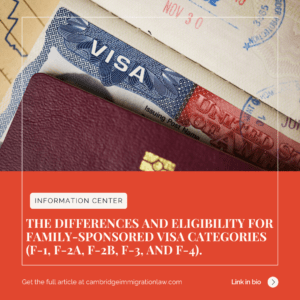THE DIFFERENCES AND ELIGIBILITY FOR FAMILY-SPONSORED VISA CATEGORIES (F-1, F-2A, F-2B, F-3, AND F-4)
 THE DIFFERENCES AND ELIGIBILITY FOR FAMILY-SPONSORED VISA CATEGORIES (F-1, F-2A, F-2B, F-3, AND F-4)
THE DIFFERENCES AND ELIGIBILITY FOR FAMILY-SPONSORED VISA CATEGORIES (F-1, F-2A, F-2B, F-3, AND F-4)
The United States offers several family-sponsored visa categories (F-1, F-2A, F-2B, F-3, and F-4) that allow U.S. citizens and lawful permanent residents to bring their family members to the country. Each category has specific eligibility criteria and unique features, making it essential to understand the differences to determine which one suits your situation best. Let’s delve into these categories to shed light on their eligibility and distinctions.
F-1 Visa Category: Unmarried Sons and Daughters of U.S. Citizens
- Eligibility: Unmarried children of U.S. citizens who are 21 years or older.
- Characteristics: No age restrictions for sponsoring U.S. citizens; waiting period for green cards may apply.
F-2A Visa Category: Spouses and Children of Green Card Holders
- Eligibility: Spouses and unmarried children (under 21) of lawful permanent residents (green card holders).
- Characteristics: Faster processing times; limited annual visa numbers may lead to waiting periods.
F-2B Visa Category: Unmarried Sons and Daughters (21 Years and Older) of Green Card Holders
- Eligibility: Unmarried children of lawful permanent residents who are 21 years or older.
- Characteristics: Waiting period for visa numbers; longer processing times compared to F-2A.
F-3 Visa Category: Married Sons and Daughters of U.S. Citizens
- Eligibility: Married children of U.S. citizens and their spouses and minor children.
- Characteristics: May experience longer waiting periods due to visa number limitations.
F-4 Visa Category: Brothers and Sisters of U.S. Citizens
- Eligibility: Siblings of U.S. citizens, their spouses, and minor children.
- Characteristics: Typically has the longest waiting period among family-sponsored categories due to visa number constraints.
Understanding these family-sponsored visa categories is crucial when planning to bring your loved ones to the United States. It’s important to note that visa availability can vary, impacting processing times. Consulting with an immigration attorney can help you navigate the complexities of family-sponsored immigration and choose the most suitable category for your situation.


Comments are closed.